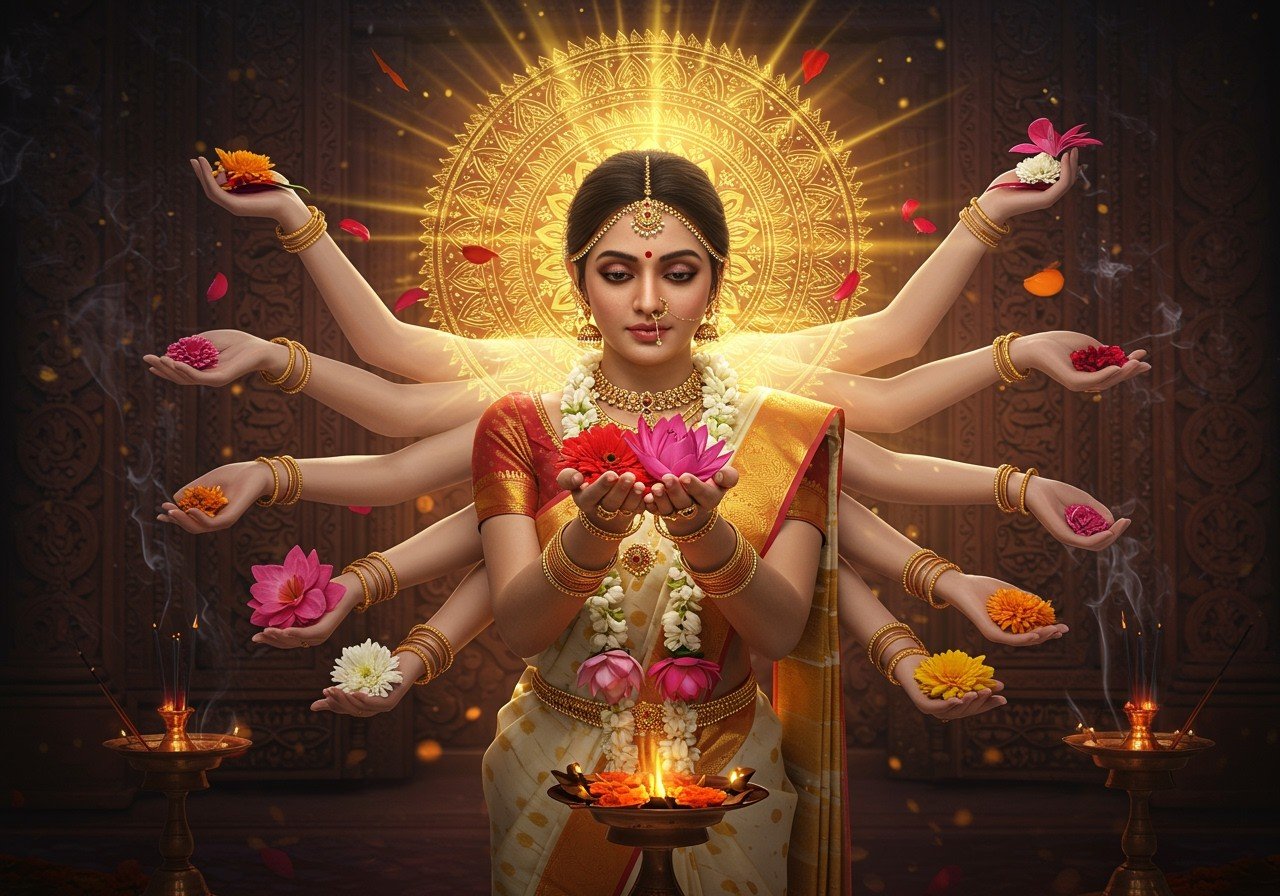
In our rich Hindu tradition, the act of offering flowers, known as Pushpanjali, holds deep spiritual significance. It’s more than just a ritual; it’s a heartfelt expression of reverence, a bridge between the tangible and the divine. Across India, this sacred tradition connects us with our roots, reminding us of the beauty and transience of life, much like the delicate blooms we offer. From daily pujas in our homes to grand celebrations in temples, Pushpanjali is an integral part of our worship, symbolizing purity, devotion, and the very essence of bhakti.
Thinking about incorporating Pushpanjali into your daily life? Poojn.in makes it effortless to embrace this tradition. Our online store brings a wide selection of puja essentials right to your doorstep, ensuring your offerings are always made with utmost sincerity and reverence.
The profound meaning behind offering flowers
Pushpanjali is an act of surrender, a way of offering our purest selves to the divine. Flowers, in their vibrant hues and delicate fragrances, embody purity, beauty, and the ephemeral nature of existence. Each bloom carries its own unique symbolism, carefully chosen for its color, fragrance, and association with specific deities. The intention behind each offering and the mindfulness with which it is performed are paramount, fostering an inner transformation within the devotee.
Would you like to learn more about the significance of sacred offerings? Check out our blog post about sacred offerings in Hindu rituals.
Exploring Different Forms of Pushpanjali
Raktha Pushpanjali: Seeking Protection and Blessings
Raktha Pushpanjali, a distinct form of this ritual, involves offering red flowers, potent symbols of divine energy and power. Resonating deeply with deities like Durga and Ganesha, these vibrant blooms represent strength, passion, and the unwavering spirit within us. Red hibiscus or roses, often chosen for this offering, are believed to invoke protection and divine blessings, shielding us from harm’s way.
Performing Raktha Pushpanjali calls for utmost devotion and respect, a pure heart, and a commitment to non-violence. During Navratri, or in times of personal trials, families often turn to this ritual for strength and guidance. The vibrant red of the flowers serves as a powerful reminder of divine support and the resilience of the human spirit.
Bhagyasooktha Pushpanjali: Inviting Prosperity and Fortune
Bhagyasooktha Pushpanjali is an age-old tradition focused on attracting prosperity and success. Performed during auspicious occasions like Diwali, this ritual involves offering flowers alongside the recitation of specific mantras, infusing the atmosphere with powerful spiritual vibrations that invite good fortune. Golden marigolds and lotus flowers, symbolic of wealth and enlightenment, are the preferred choices for this offering, believed to usher in abundance and positive transformation.
Swayamvara Pushpanjali: A Prayer for Marital Harmony
Swayamvara Pushpanjali, a ceremony of exquisite beauty, seeks blessings for a harmonious and fulfilling married life. Jasmine, with its pristine white petals and intoxicating fragrance, is the flower of choice for this ritual, offered to Goddess Parvati, the embodiment of love and devotion. Traditional wisdom suggests that Swayamvara Pushpanjali can facilitate favorable marriage alliances and strengthen existing bonds, fostering a deep connection between partners rooted in spiritual love.
Pushpanjali in Modern Life: A Seamless Integration
In today’s fast-paced world, incorporating Pushpanjali into our daily routines offers a much-needed spiritual anchor. Thanks to the convenience of online platforms like Poojn.in, accessing authentic ritual items has never been easier. Families can now seamlessly integrate these sacred practices into their lives, strengthening bonds and fostering a deeper sense of connection within their homes and communities.
Flowers: Symbols of Purity, Devotion, and Connection to the Divine
Flower offerings are an intrinsic part of Hinduism, embodying purity, devotion, and our connection to the divine. They signify our surrender of ego, our gratitude for nature’s bounty, and our deepest expressions of love and reverence.
-
Daily Puja: Flowers are central to daily worship, arranged in beautiful patterns or offered as single blooms to our beloved deities.
You can easily purchase all the necessary samagri for daily puja, including roli and kumkum, from the comfort of your home through Poojn.in.
-
Festivals: During joyous celebrations like Diwali and Navratri, flowers adorn our homes, temples, and altars, creating a vibrant and sacred atmosphere.
Find all the festive essentials you need at Poojn.in’s Pooja Samagri section.
-
Garlands: Fragrant garlands of jasmine, marigold, and rose, lovingly woven together, are offered to deities as symbols of respect, love, devotion, and surrender.
Poojn.in offers a wide range of puja items, including beautiful garlands, making it easy to perform these rituals.
-
Specific Flowers and Symbolism: From the lotus, symbolizing purity and enlightenment, to the jasmine, representing love and devotion, each flower carries its own unique significance, enriching our spiritual practice.
Learn more about the rich traditions of Bhajans and Kirtans, which often incorporate flowers, in our blog post here.
Beyond their ritualistic importance, flowers have the power to transform our homes into sacred spaces. By placing them near our prayer altars, we invite positive energy and create an environment conducive to peace and spiritual growth. Just as we offer prasad, a symbol of divine acceptance, the offering of flowers becomes a sacred exchange, a gesture of devotion and gratitude.
Poojn.in: Your Partner in Pushpanjali
At Poojn.in, we understand the importance of having everything you need for your Pushpanjali rituals readily available. That’s why we offer a comprehensive selection of traditional puja items, catering to diverse traditions across India. Our dedicated Pooja Samagri section boasts over 180 authentic items, including fresh flowers, traditional offering plates, and complete Pooja kits. For added convenience, we provide pre-arranged kits that ensure you have everything you need for a seamless Pushpanjali experience.
You can reach us via:
- Website: www.poojn.in
- Phone: 03369029784
- WhatsApp: 9476142738
Embracing Tradition, Enriching Our Lives
Pushpanjali isn’t just about preserving our cultural heritage; it’s about enriching our lives with spiritual meaning. These rituals, passed down through generations, remind us of the values we hold dear: strength, prosperity, harmony, and unwavering devotion. Whether we seek protection, abundance, or simply a deeper connection to the divine, Pushpanjali offers a path towards spiritual fulfillment. In a world that’s constantly changing, these rituals serve as a comforting constant, connecting us with our families, our communities, and the divine. They are a celebration of our heritage, an invitation to infuse our lives with positivity, and a testament to the enduring power of faith.
Frequently Asked Questions about Pushpanjali
Why do we perform Raktha Pushpanjali? Raktha Pushpanjali is a powerful ritual performed to invoke the blessings of the Goddess for good health and protection. The offering of red flowers symbolizes the devotee’s life force, a gesture of deep devotion and surrender.
What is the significance of Bhagyasooktha Pushpanjali? Bhagyasooktha Pushpanjali is performed to attract prosperity and good fortune into our lives. The chanting of the Bhagyasooktha, a Vedic hymn, accompanied by the offering of flowers, is believed to invoke divine blessings for abundance.
What is the purpose of Swayamvara Pushpanjali? Swayamvara Pushpanjali is a beautiful ritual performed to seek blessings for marital harmony and to find a suitable life partner. It is a prayer for a blessed and fulfilling married life.
Which flowers are traditionally used in Pushpanjali? The choice of flowers depends on the specific deity and the occasion. Jasmine, marigold, lotus, and red hibiscus are some of the commonly used flowers, each carrying its own symbolic meaning.
Can I perform Pushpanjali at home? Absolutely! Pushpanjali can be performed in the sacred space of your home. All you need is an image or idol of the deity, fresh flowers, and a clean, dedicated space where you can offer your prayers with sincerity and devotion.
Is Pushpanjali specific to a particular faith? Pushpanjali is primarily associated with Hindu rituals, a common practice in temples and homes as a mark of respect and devotion to the deities.
How often should Pushpanjali be performed? The frequency of Pushpanjali is a personal choice, guided by individual beliefs and the specific occasion. Some devotees incorporate it into their daily worship, while others may choose to perform it on special occasions or during festivals.


